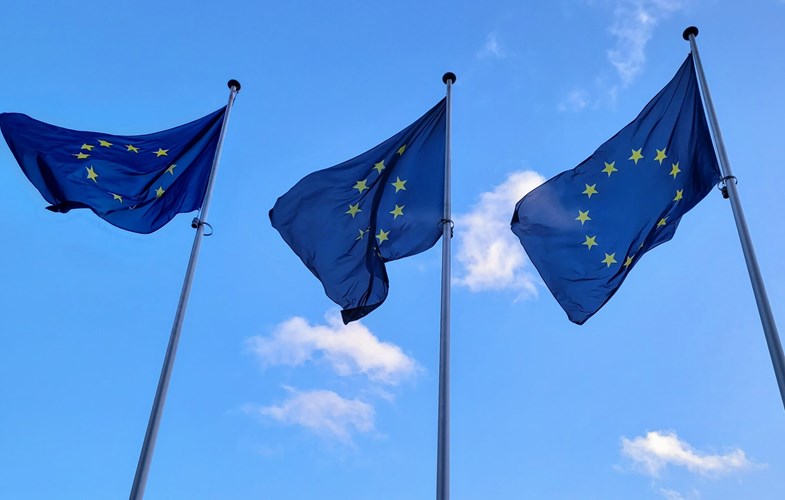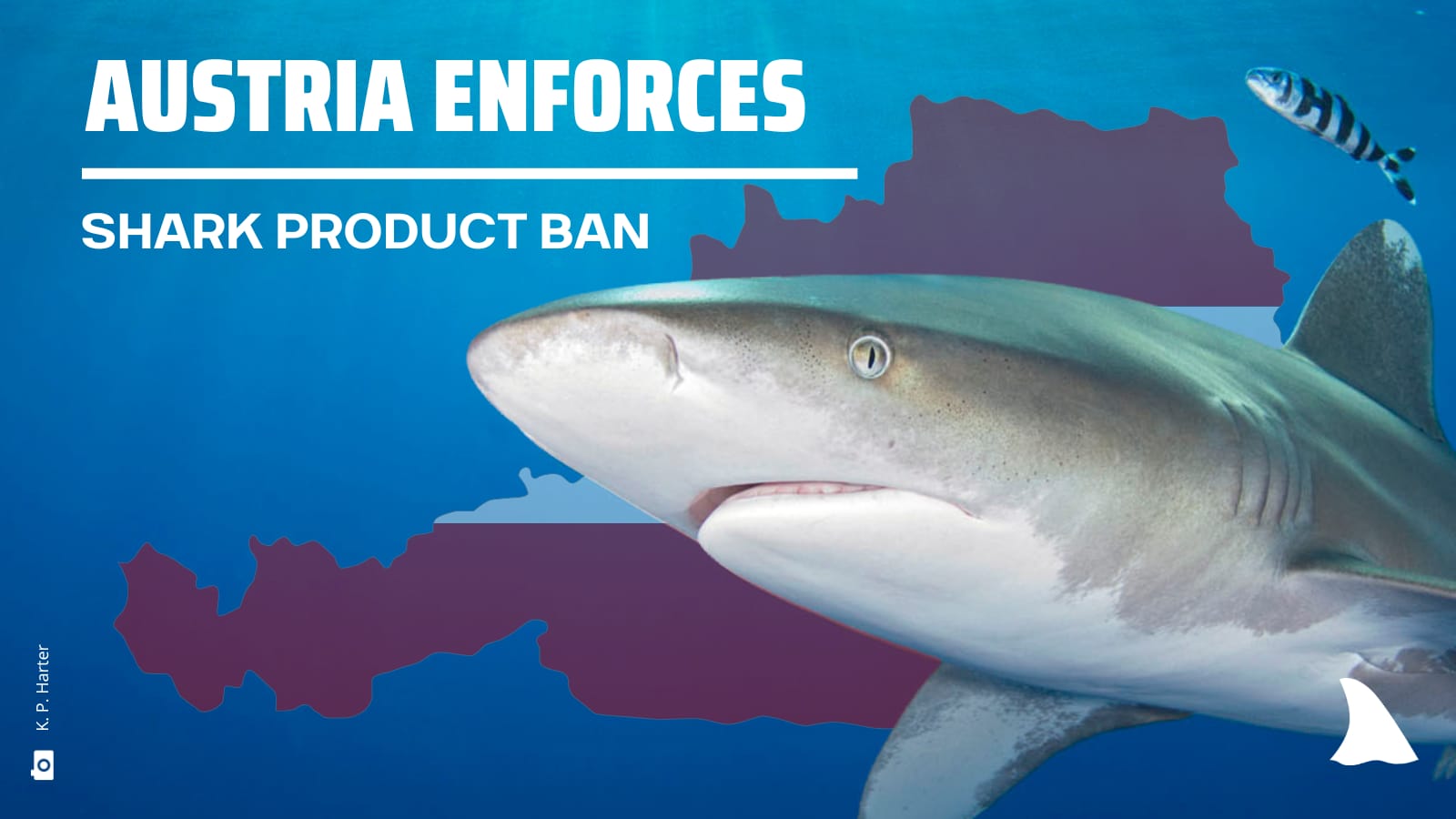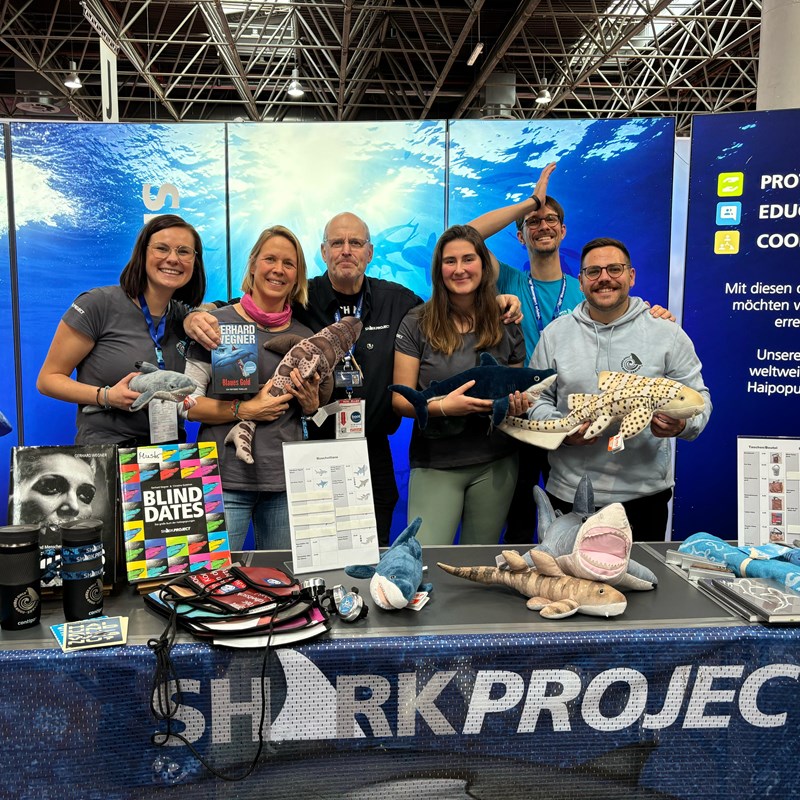

An Analysis of the public hearing of the ECI by Sharkproject
15. April, 2023
Europe Calling to Save Sharks: Will the EU listen to the Request of its Citizens?
Recently there was finally the public hearing of the EU Citizens' Initiative (ECI) "Stop Finning - Stop The Trade" where more than 1,1 Million EU citizens demanded a ban on the trade with loose shark fins in the EU. For Sharkproject Dr. Iris Ziegler, Leader of the International Cooperation Team, analyzed the public hearing in detail.
Already since 2004 Sharkproject fights against finning. Accompaning the ECI there was sent an open letter to the EU which was signed by over 100 marine conservation and animal welfare organisations.
- citizens' initiative successful
- EU Parliament must act now
- ban the fin trade
You can summarize the essential content in 5 bullet points:
- Successful EU Citizens’ Initiative to End the Trade of Shark Fins in EU
- Global Over-exploitation of Shark Populations by the International Shark Fin Trade
- Public Hearing in EU Parliament: Europêche Repeating False Claims about Sustainable Shark Fishing by EU Fleets
- The Political Debate of the Pros and Contras of the ECI’s Request for a Trade Ban for Fins
- Waiting for the Commission’s Response
On the left you will find a PDF with the detailled analysis by Dr. Iris Ziegler.

© Petra Schwerdtfeger

© Petra Schwerdtfeger

© Petra Schwerdtfeger
Successful EU Citizens’ Initiative to End the Trade of Shark Fins in EU
In January the EU Citizens’ Initiative (ECI) handed over 1.1 million votes from EU citizens in support of a new regulation requiring that fins must be naturally attached to the carcass of the shark (sharks being all species of sharks and rays) when imported into, transiting through, or being exported from the European Union. Thereby EU citizens have clearly urged the European Union taking action against the global threat of more than one third of all shark and ray species going extinct within the next decades.
Banning the finning at Sea includes several advantages for the protection of the animals. The major pro is that the carcasses need much more space in the cargo hold and therefore less animals can be killed per tour. Furthermore this guarantees that one can identify protected species without a costly DNA test. So can be ensured that endangerd species aren't traded.
Individual countries are already pioneers. Canada aleady banned the Import and Export of loose fins back in 2019. A bill to ban the import of shark fins and shark fin products in the United Kingdom has already passed the second reading in the House of Lords. Austria unanimously decided in December 2022 to prohibit the import of all shark products. The United States of America bans the trade and possession of shark fins and shark fin products.

© Petra Schwerdtfeger

© Petra Schwerdtfeger

© Petra Schwerdtfeger
Global Over-exploitation of Shark Populations by the International Shark Fin Trade
The international fin trade is fueling the global over-exploitation of shark populations to which also EU fisheries contribute by targeting vulnerable shark species both in national waters and the High Seas of the Atlantic, Indian Ocean and the Pacific. Over 100 million sharks are killed by fisheries every year, often just for the value of their fins, which then end up on Asian plates as shark fin soup. And not only sharks, but also many species of rays are sought-after in the fin trade, sold at top prices of $1,000 per kg on Asian markets. As a result of this massive over-exploitation, over one third of all shark and ray species worldwide are now threatened by extinction. Therefore, over two thirds of the nations have agreed at the last CITES Conference of the Parties (COP19) to list about 90 % of shark species impacted by the global shark fin trade making them subject to trade regulations starting in 2024.

© Petra Schwerdtfeger

© Petra Schwerdtfeger

© Petra Schwerdtfeger
Public Hearing in EU Parliament: Europêche Repeating False Claims about Sustainable Shark Fishing by EU Fleets
The successful Initiative was assigned to PECHE, the the fisheries’ Committee, which are obviously interested in stopping this citizens’ request from progressing into new legislation. As this reduces profits for the European shark fishing industry, representatives of the fishing industry were eager to claim that the EU shark fishing operations are the most sustainable fisheries in the world. Daniel Voces de Onaindi, Managing Director of Europeche, the political representation of EU fisheries in the PECHE Committee stated in his presentation several times that EU fleets condemn finning and that they have never practiced finning, claiming also that there has never been any infringement or sanction on this in the EU. This can be falsified several times (details in the PDF).
According to him the EU fleets don't target prohibited shark species - but he didn't mention that only a fews shark species are really protected in EU waters. Retention bans by different RFMOs differ largly. (For further details also consult the PDF.)
According to him only two shark species (blue sharks and shortfin makos) are allegedly targeted in the swordfish longline fisheries by Spain, Portugal, and France. After the decision of the EU Scientific Review Group (SRG) rating the trade with shortfin mako from the Atlantic not being sustainable he claims that catches of shortfin mako by EU fleets in the Atlantic have gone down to zero nowadays. But he didn't mention that Portugal and Spain caught more than 1,000 tons of shortfin mako despite retention bans having been in place most of the year. That is the same quantity as the years before. A detailled statement can be found in the PDF.
Furthermore Europêche claims that blue shark is the most widely distributed and a fast-growing shark species and therefore noch endangered. But he refers to studies that ar over 10 years old. You will find more details to this statemen also in the PDF.
According to Daniel Voces de Onaindi you can easily distinguish blue shark fins from other fins. Maybe not the inspectors, but he can ...
According to Europêche fins are fully traceable as all EU fleets must land all sharks with fins naturally attached since 2013. But only 2 % of the ships landing in EU ports are inspected. Plus EU-ships that land elsewhere outside the EU aren't inspected at all. (Consult the PDF for a longer explaination.)
Daniel Voes de Onaindi claims that only to 40-35% from the value from the shark trade from fins while 60-65 % of the value comes from the meat and that therefore shark fishing would not be profitable without the profits obtained from the meat. However the fins only make 5 % of the weight. In combination with the limited space in the cargo holds the real calculation looks very different.
In the end he referred to the need of shark fishing to provide food security and a healthy and nutritious diet for Europeans, rich in vitamins and good as a heart disease diet and that “banning is not the solution, it is not justified, and it is not an option for our fishermen”. These claims clearly ignore the threats to human health associated with eating sharks due to the high levels of methylmercury and other contaminants accumulating over the food web in these long living top predators. (More details can be found in the PDF.)

© Petra Schwerdtfeger

© Petra Schwerdtfeger

© Petra Schwerdtfeger
The Political Debate of the Pros and Contras of the ECI’s Request for a Trade Ban for Fins
Dr. Silvia Earle, the former NOAA scientific director and founder of Mission Blue, stressed, that a healthy ocean is needed by both sharks and humans but depends on healthy shark populations, de-mything the common fisheries’ claim that sharks are needed for food security.
Stefanie Brendl, Shark Allies, also emphasized that the value from the export of fins for shark fin soup is the main driver behind the massive targeting of sharks by industrial fleets and compared the mass killing with removing “red blood cells off the ocean, take too many of them and the whole system suffers.”
Bradley Soule shared his experience from 20 years of fisheries enforcement and disclosed that in all that time he has never met an enforcement officer who believed that the current system of trading detached fins is enforceable.
In the following debate several concerned Members of the European Parliament also voiced their concerns over the presentation from Europeche and supported the request of the ECI, while some Spanish MEPs clearly supported the interests of Spanish shark fisheries, ignoring the obvious.
Many MEPs thanked the initiators of the Citizens’ Initiative and openly stated their support. Namely they were: Grace O'Sullivan (Greens, Ireland), Francisco Guerreiro (Greens, Portugal), Angela Danzi (Italy), Ska Keller (Greens, Germany), Manuela Ripa (Greens, Germany), Peter van Dalen (Christian Democrats, Netherlands), Peter Schmidt (President of Agriculture, Rural Development and Environment Section of the European Economic and Social Committee), and Caroline Rose (Greens, France). What they said and more details to our spokes people you will find in the PDF.
Although not all members of the PECHE Committee were present at the hearing and only few added their views in support of the Europêche position, their arguments altogether sounded rather repeated, and overall weak in view of the strong arguments that had been presented by the supporters. Ana Miranda (Greens, Spain, Vice Chair of Peche), Clara Aguilera (Group of the Progressive Alliance of Socialists and Democrats in the European Parliament, Spain) and Francisco Milan Mon (Christian Democrats, Spain) also shared their views which can be found in the PDF.

© Petra Schwerdtfeger

© Petra Schwerdtfeger

© Petra Schwerdtfeger
Waiting for the Commission’s Response
Virginijus Sinkevičius, the EU-Commissioner for the Environment, Oceans and Fisheries, delivered the final speech at the hearing but had unfortunately missed most of the debate. He therefore had not heard the powerful arguments provided by the ECI and the strong support for a trade ban presented by both, experts and many members of the EU Parliament, when stressing that the EU has to also meet its obligations within the community of nations. However, he admitted that gaps in reporting and enforcement of existing regulations clearly exist and must be addressed, while leaving it open what might be the response by the Commission to the ECI’s request for a fin trade ban.
He thanked the representatives of the ECI for having started this initiative and announced that the Commission will communicate its decision on how to progress this further, as required by the ECI statutes, by the end of July.
We certainly would have wished for a clearer statement from him at this point, especially as we are aware of the huge influence the fisheries have in trying to influence this decision, which really must be evaluated from a conservation perspective and in view of the non-enforceability of existing conservation regulations, and the EU’S obligation under CITES and CMS.
Fisheries fearing for their profits may still not be willing to accept the extent of the global decline of sharks and the loss of biodiversity our oceans are experiencing. But by now even those fisheries should be aware that it is only a matter of time until all shark populations will be overfished and stocks collapsing, generating much larger, negative impacts for all fisheries and the ability of marine ecosystems to provide food for this and future generations. However, as this will once again hit the global South first and hardest, the rich EU fisheries apparently prefer to ignore the facts, the existing science, and the clear demand of 1.1 million EU Citizens.

© Petra Schwerdtfeger

© Paul Munzinger

© Petra Schwerdtfeger


